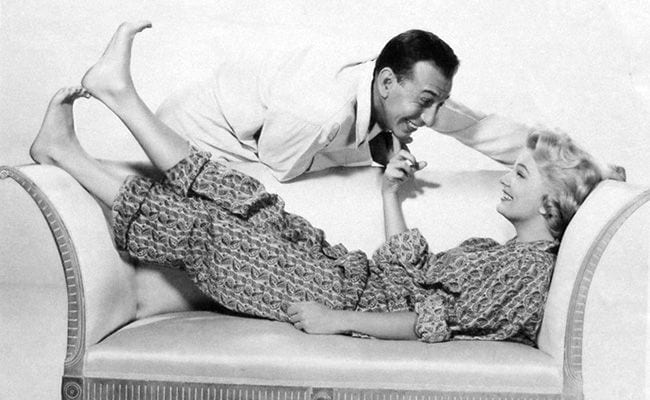
Although the leering poster for this movie promises something naughty while the trailer calls it “hilarious” and “riotous”, this is a comedy of misunderstanding and discomfort that’s almost not a comedy, except in the broadest sense that nobody dies. This slice of midcentury unease is now available on demand from Warner Archive.
Jim Fry (Jose Ferrer) is a complacent manager in a company of obtuse import where he’s worked for 15 years. He and his wife of nine years, Ginny (Gena Rowlands in her film debut), have arranged their lives into such a clockwork routine that no dialogue is necessary for the lengthy opening sequence of waking up (from twin beds), showering and eating breakfast. If you’re an arty film buff who’s seen Chantal Akerman’s Jeanne Dielman, where the characters make and eat breakfast in real time, it’s strangely reminiscent and almost avant-garde.
On the same day that Ginny announces she might be pregnant, twin beds or not, Jim begins to suspect he’s going to be fired after his firm’s takeover by a larger corporation. The movie mostly follows his point of view, and after he and the viewer have been allowed to stew and he’s brought himself to the humiliation of admitting his fears, the viewer (but not Jim) is reassured of the true situation, so that now we experience Jim’s plight through ironic distance more than direct identification.
What’s most interesting about this articulate little tempest in a coffee pot (one of the few metaphorical cliches not employed by Jim Backus in his cameo) is that even though Jim’s fears may be misplaced in this case, they remain valid. He still might lose his job next month or next year, when another company takes over or the place goes bankrupt or who knows what. The realities he’s forced to face, about his age in the work force and in a sequence where he adds up expenses and how many payments he’s making on what objects own him — all before the baby arrives — are enough to wipe the smile off anyone’s face, and this is part of what keeps the movie from hilarity.
The script by Rip Van Ronkel (who plays the cigar salesman) is based on this queasiness in the Mad Men world of postwar corporate America. Perhaps it’s too much to call it a movie about malaise, yet malaise is in the corridor, being paged. So which is the illusion: the fears or the dismissal of the fears? This is how comedy mines the same sources as sadness, though in this case not a “hilarious” comedy. The only laugh-out-loud moment is when a gossipy friend tries to make Jim feel better by telling horror stories. In choosing credibility over I Love Lucy, the movie might be dull, but it’s got some little piece of grit in there, even if it never becomes a pearl.
Also in the picture are Bobby Troup and Joanne Gilbert as friends, Richard Deacon as Ginny’s doctor, Philip Ober and Edward Platt as the new bosses (same as the old bosses), Nancy Kulp as (what else?) a secretary, and Werner Klemperor, Francis De Sales, Charles Watts, Malcolm Atterbury and Lucien Littlefield as suits. Shot in a clear but drab black and white Cinemascope by George J. Folsey, this could have used the “oomph” of color, unless they’re really try to imply something.
At this period, Ferrer directed himself in a handful of films emphasizing acting and dialogue and therefore dependent on the script; the highlight was The Great Man (1956). This is a minor but competent entry for him, and, as comedies of the era go, it has the saving grace of never being dumb.


![Call for Papers: All Things Reconsidered [MUSIC] May-August 2024](https://www.popmatters.com/wp-content/uploads/2024/04/all-things-reconsidered-call-music-may-2024-720x380.jpg)



